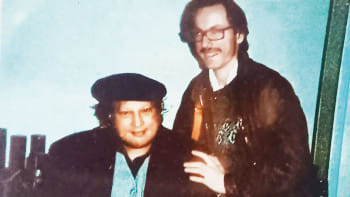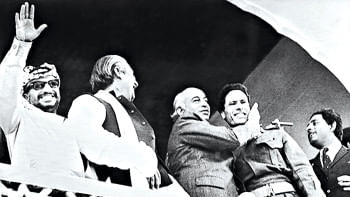Bot In Focus
A freedom fighter’s journey to Mujibnagar
The necessity that was felt a few days after the Declaration of Independence of Bangladesh was that of a Government which could take upon itself the burden of directing the liberation struggle.
'We must reject religious majoritarianism to ride the wave of Asian resurgence'
The Daily Star (TDS): Your family was closely involved with the Liberation War of Bangladesh. Could you please provide some insights into this historical involvement?
Silencing the subaltern voice
Historian Willem van Schendel divides the historiography of the War of 1971 into two broad categories: i) first-generation historiographies and ii) second-generation historiographies.
In the Name of Lalon
In a jungle by a wide river bank, a small group is sitting amongst the dangling roots of a luscious banyan tree. The single-stringed ektara, four-stringed dotara, wood-bead necklace mala, hand-spunned bright-coloured cotton gamccha and white outfits identify the members as Bauls, the traditional mystic musicians of Bangladesh.
Bangladesh and 1971
Listen, from one Mujibur/ A thousand Mujib’s voices rise/ The sounds and echoes of those voices/ Ring out through the wind and the sky/ Bangladesh, my Bangladesh….
Vangiya Sahitya Parishat, the first Bengal Academy of Literature
‘Academy’, as many of us know, is a word that comes from the French word ‘academie’, evolving from Latin ‘academia’—the ultimate ancestor of both being Greek ‘akademeia’.
A Call for Bengali Language Outreach
Apparently, Bengali (or Bangla) is the seventh spoken language in the world by population. By some statistics, its position is sixth, and even fifth in another! I am not elated by this because the number of speakers of a language does not demonstrate its acceptance nor its popularity, globally or locally.
Politics and Archaeology of Ayodhya
British administrator and archaeologist Alexander Cunningham, who served as the first director-general of the Archaeological Survey of India (ASI), founded in 1861, conducted the first archaeological survey in 1862-1863, followed by the second one in 1889-1891.
Global South and global North
Both my parents had been actively engaged in the struggle for the liberation of Algeria from French colonialism. A few months after its independence, we left France to live in Algiers, sharing the house with two Algerian families whose women, Fatima and Jima, were like other mothers to me.
Pramila: A Tradition Characterized
“People here grumble and say that the heart of the Poet in Meghanad is with the Rakhasas. And that is the real truth. I despise Ram and his rabble; but the idea of Ravan, elevates and kindles my imagination; he was a grand fellow.”
With and beyond Nusrat Fateh Ali Khan
Pierre Alain-Baud, (Pyaro), the author of Le Messager du Qawwali (Voix du Monde) (Demi Lune 2008), and Kazi Abdullah Al Muktadir, the book’s Bangla translator in Shahen Shah E Qawwali: Nusrat Fateh Ali Khan (Pathak Shamabesh 2022) talked with Nazia Manzoor, Editor of the Daily Star Books. The authors shared anecdotes. What started out as a fun experiment, ended as a lasting experience in the hearts of all of us who were present that day.
A Tribute to My Martyr Teachers
The Pakistani occupation army wrote a black chapter in the history of our War of Liberation on the 14th-15th December, 1971 by killing intellectuals in Dhaka city in a planned way.
Haraprasad Shastri: An Unusual Pundit
Haraprasad Shastri (1853-1931, Bhattacharya was the original family name) was a Sanskrit scholar, commonly referred to as a ‘pundit.
How did the U.S. and Bangladesh come to be at the same negotiating table on climate change?
We hear a lot about the COP meetings in the media. Most of what we hear is generally around the time when these meetings of high-ranking officials from most of the countries of the world are held, usually late November or early December.
The mountains and hills of South Asia’s languages and dialects
South Asia is one of the most intensely multilingual regions in the world. It covers over 5 million square kilometres, has a population of approximately 1.9 billion (around 25% of the world’s population), and is home to five families of languages (the Indo-European, Iranian, Dravidian, Austro-Asiatic or Munda, and Tibeto-Burman).
The night of unspeakable horror: A survivor’s account
“Ding dong ding dong,” an irregular bell continued to resound within Dhaka Central Jail on a Monday at around 3 a.m. This unusual and disquieting disturbance echoed throughout various cells and wards, catching the incarcerated off guard.
1971 and the case for secularism in Bangladesh and India
Bangladesh has just celebrated fifty years of independence; this year also marks fifty years since its Ganoparishad ratified the Constitution of Bangladesh. Anniversaries are as worthy occasions as any to recall why certain ideological principles were chosen to guide the new nation.
Bishop Heber in Dhaka,1824
Bishop Reginald Heber (1783-1826) was an Oxford educated Anglican clergyman from England, a man of letters and a notable hymn-writer. As an intrepid traveler and a curious observer, he has left behind an interesting travelogue entitled: ‘














